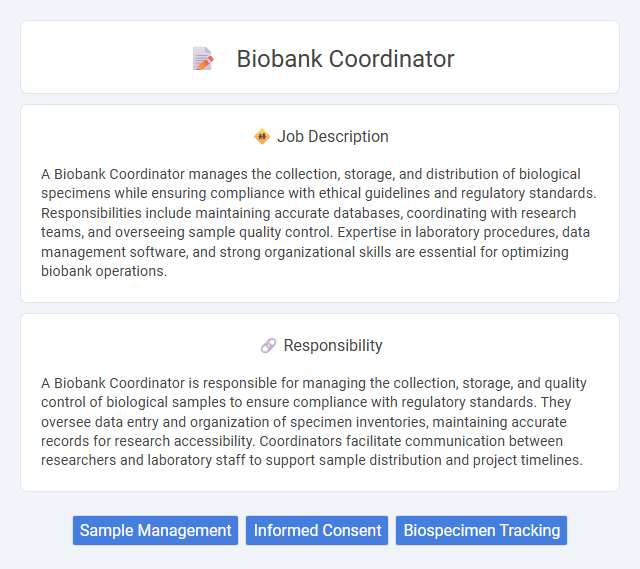
A Biobank Coordinator manages the collection, storage, and distribution of biological specimens while ensuring compliance with ethical guidelines and regulatory standards. Responsibilities include maintaining accurate databases, coordinating with research teams, and overseeing sample quality control. Expertise in laboratory procedures, data management software, and strong organizational skills are essential for optimizing biobank operations.
Individuals with strong organizational skills and attention to detail are likely to be suitable for a Biobank Coordinator role, as the job involves managing biological samples and maintaining accurate records. Candidates who are comfortable working in a clinical or laboratory environment and can adhere to strict regulatory guidelines will probably perform well in this position. Those who prefer routine and structured tasks over highly dynamic or unpredictable work settings might find this job more fitting for their abilities.
Qualification
Biobank coordinators require a bachelor's degree in biology, health sciences, or related fields, with preferred experience in sample management and data handling. Strong knowledge of laboratory protocols, data privacy regulations, and quality control measures is essential for efficient biobank operations. Proficiency in database management software and excellent organizational skills ensure accurate tracking and storage of biological specimens.
Responsibility
A Biobank Coordinator is responsible for managing the collection, storage, and quality control of biological samples to ensure compliance with regulatory standards. They oversee data entry and organization of specimen inventories, maintaining accurate records for research accessibility. Coordinators facilitate communication between researchers and laboratory staff to support sample distribution and project timelines.
Benefit
A Biobank coordinator role probably offers significant benefits including opportunities for professional growth and hands-on experience with cutting-edge biomedical research. The position may provide access to a collaborative work environment, fostering skill development in data management and sample handling. Compensation and benefits packages are likely competitive, supporting both personal and career advancement.
Challenge
The role of a Biobank Coordinator likely involves managing complex logistical and regulatory challenges to ensure proper sample collection, storage, and data management. Navigating compliance with ethical standards and maintaining data integrity might pose significant difficulties. Coordinators probably need to balance multitasking and problem-solving skills to address unexpected issues in sample handling and database accuracy.
Career Advancement
Biobank coordinators play a crucial role in managing biological sample collections, ensuring proper data documentation and compliance with ethical standards. Mastery in biobank operations opens pathways to advanced positions such as biobank manager, clinical research coordinator, or quality assurance specialist. Gaining proficiency in regulatory policies, data management software, and project leadership accelerates career growth within biomedical research and healthcare institutions.
Key Terms
Sample Management
Biobank coordinators oversee sample management by ensuring proper collection, processing, and storage of biological specimens to maintain sample integrity and quality. They implement standardized protocols and utilize inventory management systems to track sample location, condition, and metadata accurately. Effective coordination with laboratory personnel and researchers facilitates compliant sample distribution and supports valuable research outcomes.
Informed Consent
A Biobank Coordinator ensures the ethical collection and management of biological samples by overseeing the informed consent process, guaranteeing participants fully understand study objectives, risks, and confidentiality measures. This role involves coordinating communication between researchers and donors, maintaining accurate documentation of consent forms, and adhering to regulatory compliance standards such as HIPAA and GDPR. Expertise in bioethics, patient communication, and data privacy is essential to safeguard participant rights and support translational research initiatives.
Biospecimen Tracking
Biobank coordinators manage biospecimen tracking systems to ensure accurate collection, storage, and retrieval of biological samples, maintaining sample integrity and compliance with regulatory standards. They utilize advanced laboratory information management systems (LIMS) to document biospecimen metadata, chain of custody, and inventory status in real time. Effective biospecimen tracking supports translational research by providing reliable, high-quality samples for genomic, proteomic, and clinical analyses.
 kuljobs.com
kuljobs.com